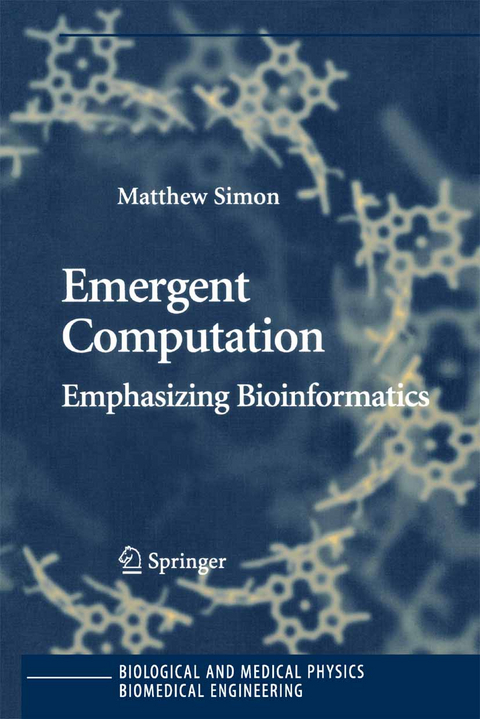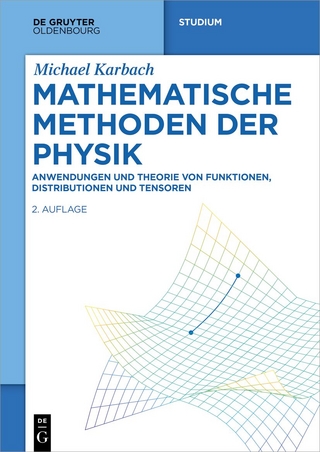
Emergent Computation
Emphasizing Bioinformatics
Seiten
2005
Springer-Verlag New York Inc.
978-0-387-22046-8 (ISBN)
Springer-Verlag New York Inc.
978-0-387-22046-8 (ISBN)
Emphasizes the interrelationship of the different classes of languages studied in mathematical linguistics (regular, context-free, context-sensitive, and type 0) with aspects to the biochemistry of DNA, RNA, and proteins.
Emergent Computation emphasizes the interrelationship of the different classes of languages studied in mathematical linguistics (regular, context-free, context-sensitive, and type 0) with aspects to the biochemistry of DNA, RNA, and proteins. In addition, aspects of sequential machines such as parity checking and semi-groups are extended to the study of the Biochemistry of DNA, RNA, and proteins. Mention is also made of the relationship of algebraic topology, knot theory, complex fields, quaternions, and universal turing machines and the biochemistry of DNA, RNA, and proteins.
Emergent Computation tries to avoid an emphasis upon mathematical abstraction ("elegance") at the expense of ignoring scientific facts known to Biochemists. Emergent Computation is based entirely upon papers published by scientists in well-known and respected professional journals. These papers are based upon current research. A few examples of what is not ignored to gain "elegance":
- DNA exists as triple and quadruple strands
- Watson-Crick complementary bases have mismatches
- There can be more than four bases in DNA
- There are more than sixty-four codons
- There may be more that twenty amino acids in proteins
While Emergent Computation emphasizes bioinformatics applications, the last chapter studies mathematical linguistics applied to areas such as languages found in birds, insects, medical applications, anthropology, etc.
Emergent Computation tries to avoid unnecessary mathematical abstraction while still being rigorous. The demands made upon the knowledge of chemistry or mathematics is minimized as well. The collected technical references are valuable in itself for additional reading.
Emergent Computation emphasizes the interrelationship of the different classes of languages studied in mathematical linguistics (regular, context-free, context-sensitive, and type 0) with aspects to the biochemistry of DNA, RNA, and proteins. In addition, aspects of sequential machines such as parity checking and semi-groups are extended to the study of the Biochemistry of DNA, RNA, and proteins. Mention is also made of the relationship of algebraic topology, knot theory, complex fields, quaternions, and universal turing machines and the biochemistry of DNA, RNA, and proteins.
Emergent Computation tries to avoid an emphasis upon mathematical abstraction ("elegance") at the expense of ignoring scientific facts known to Biochemists. Emergent Computation is based entirely upon papers published by scientists in well-known and respected professional journals. These papers are based upon current research. A few examples of what is not ignored to gain "elegance":
- DNA exists as triple and quadruple strands
- Watson-Crick complementary bases have mismatches
- There can be more than four bases in DNA
- There are more than sixty-four codons
- There may be more that twenty amino acids in proteins
While Emergent Computation emphasizes bioinformatics applications, the last chapter studies mathematical linguistics applied to areas such as languages found in birds, insects, medical applications, anthropology, etc.
Emergent Computation tries to avoid unnecessary mathematical abstraction while still being rigorous. The demands made upon the knowledge of chemistry or mathematics is minimized as well. The collected technical references are valuable in itself for additional reading.
Emergent Computation: Bioinformatics.- A Review of Chemistry.- A Review of Aspects of Automata Theory.- The Beginning Numbers.- Regular Languages: DNA and RNA.- Context-Free Languages: DNA and RNA.- Context-Sensitive Languages: DNA, RNA, Proteins.- Turing Machines and Sub-Turing Machines.- Splicing Systems, H Systems.- tRNA Structure.- Semigroups and Bioinformatics.- Automata Theory and Disciplines Other than Bioinformatics.- Automata Theory: Non-Bioinformatics Emergent Computation.
| Reihe/Serie | Biological and Medical Physics, Biomedical Engineering |
|---|---|
| Zusatzinfo | 274 Illustrations, black and white; XIV, 423 p. 274 illus. |
| Verlagsort | New York, NY |
| Sprache | englisch |
| Maße | 155 x 235 mm |
| Themenwelt | Mathematik / Informatik ► Mathematik ► Angewandte Mathematik |
| Medizin / Pharmazie ► Physiotherapie / Ergotherapie ► Orthopädie | |
| Naturwissenschaften ► Biologie ► Biochemie | |
| Naturwissenschaften ► Biologie ► Genetik / Molekularbiologie | |
| Naturwissenschaften ► Physik / Astronomie ► Angewandte Physik | |
| Technik ► Umwelttechnik / Biotechnologie | |
| ISBN-10 | 0-387-22046-1 / 0387220461 |
| ISBN-13 | 978-0-387-22046-8 / 9780387220468 |
| Zustand | Neuware |
| Haben Sie eine Frage zum Produkt? |
Mehr entdecken
aus dem Bereich
aus dem Bereich
Buch | Softcover (2024)
Springer Vieweg (Verlag)
44,99 €
Anwendungen und Theorie von Funktionen, Distributionen und Tensoren
Buch | Softcover (2023)
De Gruyter Oldenbourg (Verlag)
69,95 €


